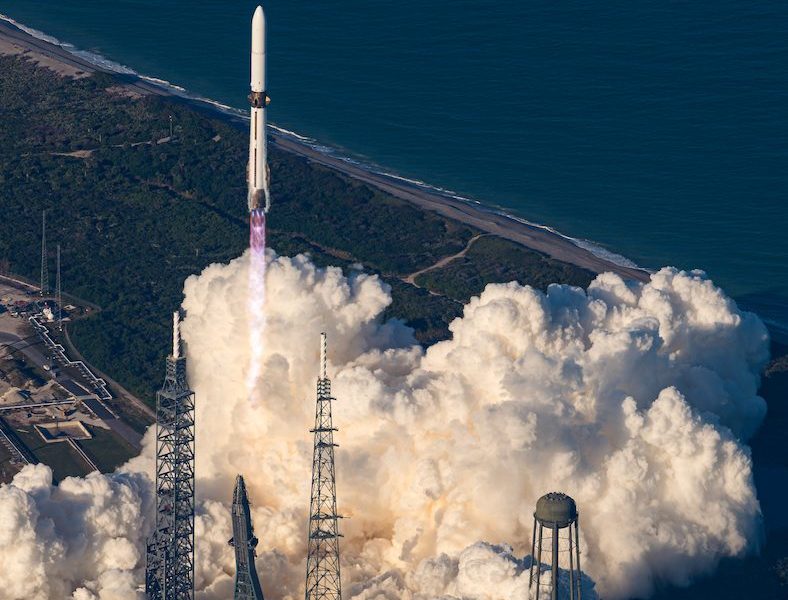Blue Origin completed a successful second launch of its New Glenn rocket Nov. 13 from Cape Canaveral Space Force Station, Fla.—and even managed to land the launch vehicle’s booster on a barge in the Atlantic Ocean.
The milestone moves the company closer to certification for the Space Force’s flagship launch program, and the ability to reuse boosters could position it to compete for a larger share of national security missions in the future.
Reusability isn’t a requirement for Space Force missions, but there are cost savings associated with reuse. Until now, SpaceX has been the only launch provider to demonstrate reusability of an orbital first stage, and the Elon Musk-owned firm has become the dominant player in the industry.
Blue Origin acknowledged the significance of its launch in a statement, stating that the mission is “just the beginning” of its plans to rapidly increase New Glenn’s flight cadence.
“Today was a tremendous achievement for the New Glenn team, opening a new era for Blue Origin and the industry as we look to launch, land, repeat, again and again,” Jordan Charles, vice president for New Glenn, said in a statement.
The firm, owned by billionaire Jeff Bezos, has a long way to go to match SpaceX, which recovered its Falcon 9 rocket’s first stage for the first time a decade ago and has successfully landed the rocket more than 500 times since.
Blue Origin plans to refurbish the used booster in less than 30 days, Aviation Week reported, with a goal of flying it on New Glenn’s next mission.

Under Phase 3 of the National Security Space Launch program, responsible for the most important military and intelligence space missions, the Space Force has selected companies with established or promising rocket vehicles to compete for military missions in two lanes. Lane 1 is for commercial-like launches with less complex requirements and Lane 2 is for more stressing missions with heavier payloads destined for more unique orbits.
Blue Origin is one of five firms eligible to compete for Lane 1 and one of three that can vie for more lucrative Lane 2 missions. In April, the Space Force chose Blue Origin, SpaceX, and United Launch Alliance—the longtime incumbent—to conduct approximately 54 Lane 2 missions between 2027 and 2032.
New Glenn’s potential share of those missions is small for now—up to seven launches through 2032. But reusability could eventually give it an edge over ULA, whose newly certified Vulcan Rocket has not yet demonstrated a recoverable first stage.
ULA has a plan to eventually recover Vulcan’s engine using a combination of a hypersonic decelerator and parachutes that would land the engine in the ocean for eventual reuse. The firm calls the recovery system Sensible Modular Autonomous Return Technology and plans to begin flight testing next year. CEO Tory Bruno has teased plans for further reusability and has also discussed options to keep the rocket’s upper stage in space to fly long-duration missions.
While New Glenn may be ahead of ULA’s Vulcan in terms of demonstrated reusability, the rocket has not yet achieved NSSL certification, which is required before a company can carry national security payloads, and it’s not clear how far along the vehicle is on that path.
As part of that process, companies must complete a tailored certification plan, which consists of a combination of successful launches and engineering data. Firms can choose to conduct two, three, six, or 14 launches; the more flights they choose, the less data they have to provide.
Unlike ULA, which was public about its two-flight certification plan, Blue Origin has not revealed the details of its approach. The company did not immediately respond to questions from Air & Space Forces Magazine about how many successful launches it needs under its certification plan, and the Space Force declined to weigh in, citing proprietary limitations.
In a statement issued after Blue Origin’s Nov. 13 launch, Space Systems Command said the company’s successful second flight “continues its process of certifying New Glenn for National Security Space Launches,” but didn’t say how far into the process the firm is.
The Space Force’s certification team from System Delta 80 was on site for the launch, SSC said in the statement.
“Certification flights are a small subset of the certification process and provide valuable analytical data to ensure each [launch service provider’s] launch system is ready to deliver our most exquisite USSF satellites supporting critical U.S. warfighters and Intelligence Community needs,” SSC said.




